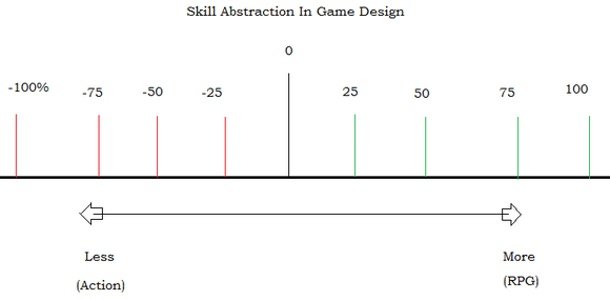
Gamasutra puts the shotgun-marriage of action games and RPGs underneath the microscope, and tracks how gameplay changes as games adjust the ratio of action elements to RPG elements. Author Josh Bycer also demonstrate s some of the issues that arise as games approach the balance point between the genres, like Mass Effect 3 promises to do.
Defining "skill abstraction" as "the degree to which player skill (or input) has an effect on gameplay", Bycer then goes on to argue that action games and RPGs traditionally existed on opposite ends of the spectrum. For the sake of this argument, non-abstracted games (think Asteroids) are at -100, and hardcore RPGs are at 100. Most games in either genre tend to hover between 75 and 50, but as publishers and developer seek wider audiences, they increasingly approach 0.
"As we move to 0 percent on the chart, the lines between the genres begin to blur. Games like The Witcher 2 or the ultimate direction of the Mass Effect trilogy are examples of this. At this point, the traditional description of the genre is not enough to describe these games."
However, developers court risk as they strive for the middle-ground.
"Mainstream game design has become a game of tug of war between keeping the fans (or core gamers) happy, while expanding the appeal of the game with the designers caught in the middle," Bycer writes. "Pulled too far one way and you have a game that keeps the fans happy, but has limited appeal. Go too far the other way and the designer can have a worse situation: a game that is too watered down for fans to enjoy, yet too inaccessible to attract a larger audience."
It's an interesting bit of analysis, and it's certainly fun to try and classify games based on how they mix genre conventions and mechanics. I'm not sure I agree with the narrow definition of core gamers as people who either want minimal skill abstraction, where their own reflexes and abilities determine the outcomes, or people who want a completely abstracted D&D-style experience.
I suspect core gamers are a bit more tolerant and eclectic in their tastes than this argument really allows. It implies that the problem with self-consciously mainstream games is that their designs are such compromises between different experiences. That might be part of the issue, but consequences (or lack the lack thereof) seem to have far more to do with why core gamers reject "watered down" designs. Hardcore action games or RPGs both demand players achieve some level of aptitude in the genre. In the middle, genre hardly exists at all.
Keep up to date with the most important stories and the best deals, as picked by the PC Gamer team.
Put another way, games at both ends of the spectrum require different sets of skills. I'm not sure what games in the middle require beyond time. And if they don't require skill, I'm not sure what is the role of the player.

